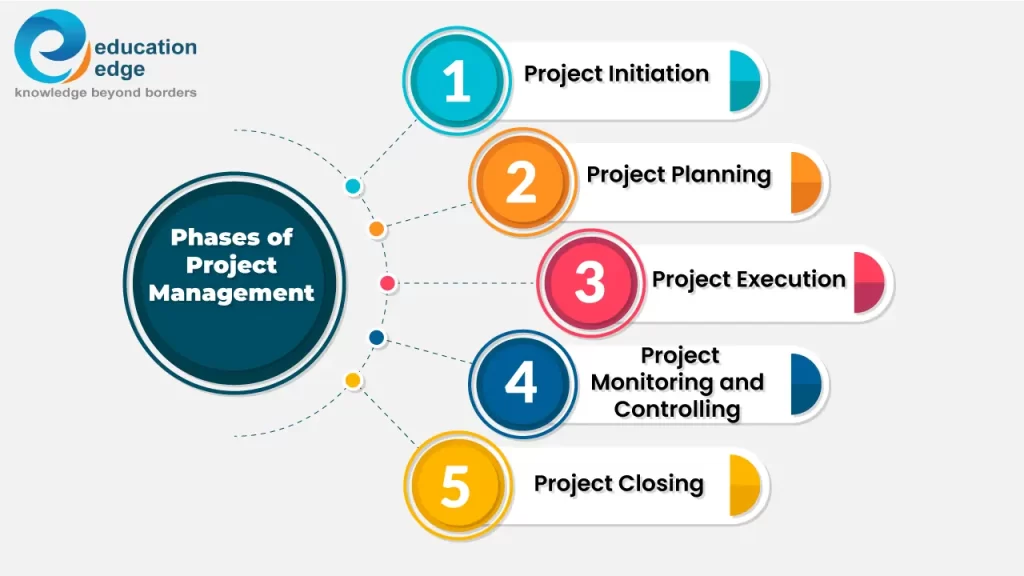
Project management can be challenging. Without solid preparation of project planning and thinking, it can feel as if you’re working blind. So, if you’re in project management, starting with the fundamentals is your best option. Here we will discuss 5 phases of project management to assist you understand project management process.
Make sure to check: Tired of Doing Project Planning? Try this New Way
Five Phases of Project Management

1. Project Initiation:
The project start phase is the initial step in transforming an abstract notion into a concrete goal. At this point, you must create a business case and define the project broadly. In order to do so, you need to assess the necessity for the project and develop a project charter.
During this stage, an idea becomes a business plan, complete with goals, project charters, and stakeholders.
2. Project Planning:
The project planning step requires extreme care because it sets the project’s blueprint. Unless you use a modern project management methodology, such as agile project management, the second phase of project management is predicted to occupy about half the duration of the total project.
During this phase, the project manager creates a detailed strategy for executing, monitoring, and controlling the project. This usually begins with setting goals. The S.M.A.R.T. and CLEAR methods are the most common when creating project goals.
S.M.A.R.T Aims

The SMART’ criteria ensure that the objectives you set for your project are effectively examine. It is a tried-and-true strategy that helps project managers to set specific and attainable targets.
S.M.A.R.T. stands for Specific, Measurable, Achievable, Realistic, and Timely.
- Specific – To set specific goals, answer the following questions: who, what, where, when, which, and why.
- Measurable – Develop criteria for measuring a goal’s success.
- Attainable – Determine the most critical goals and what it will take to attain them.
- Realistic – You should be willing and able to work towards a certain objective.
- Timely – Establish a timeline for achieving the goal.
C.L.E.A.R Aims

The ‘CLEAR’ method of goal planning aims to accommodate the dynamic character of today’s business. Today’s fast-paced organizations want flexibility and instant outcomes, and CLEAR can assist citizen developers with that.
C.L.E.A.R. stands for Collaborative, Limited, Emotional, Acceptable, and Refined.
- Collaboration – The goal should be to encourage staff to work together.
- Limited – They should be limited in scope and time to keep things manageable.
- Emotional – Goals should touch into employees’ passions and be something to which they can build an emotional connection. This can improve the overall quality of the work.
- Appreciable – Break major goals into smaller chores that can be easily accessible.
- Refinable – Be flexible and revise goals as new situations arise.
3. Project Execution:
When the planning step is over, it is time to begin implementing the strategy. The actual work is completed here.
During this stage, project managers define processes, assign tasks to team members, and ensure that everyone is on track. They also keep stakeholders and teams updated as the project advances.
4. Project Monitoring and Controlling:
The project monitoring and controlling phase runs along with project execution, ensuring that project objectives and deliverables are defined.
During this phase, the project manager works with their team to handle any challenges that may arise. This entails reviewing and updating the plan on a regular basis to reflect changes in the scope of the project or the availability of resources.
5. Project Closing:
The final stage of the project management lifecycle. This is the stage at which you submit the deliverables for approval to the project sponsor. The team disbands at this phase, and all contractual hires for the project are terminated.
Following project completion, the project manager conducts a final review to document the project’s lessons learned as well as any data that may be valuable in the future.
You may also check: Project Management Institute: Gateway to a Successful Career!
Frequently Asked Questions
What is the most critical stage of a project?
Phase of project implementation and monitoring. This is the most critical and crucial stage of your project management life cycle. It marks the official commencement of the project.
Which project phase is the longest?
The Project Execution Phase is typically the longest in the project life cycle and consumes the most energy and resources.
When should a project be officially closed?
All work has been done in accordance with the project plan and scope. All project management processes have been completed. You have got final sign-off and permission from all parties.







